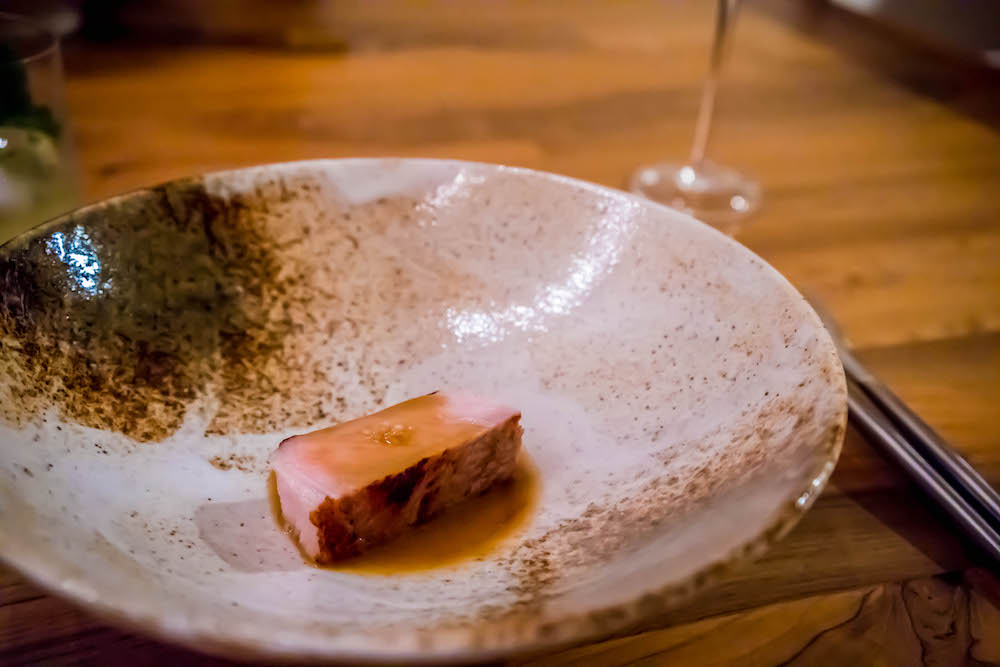Heritage pork, bone marrow sauce, green olive tapenade
I think pork is an under-appreciated meat compared to beef here in the US. This recipe is designed to showcase the exceptional quality heritage pork that is available at Fatted Calf here in San Francisco. I use thick-cut loin chops and brine them with shio koji for 24h to ramp up their savory umami qualities. The sauce here is a pretty standard reduction-style sauce, with some bone marrow kicked in for more fatty savoriness. The tapenade served as a sidecar condiment is sharp with green olives, capers and preserved lemon which is necessary to cut the richness of the dish. The sauce recipe is a bit light on directions, as to be honest I do not measure my reductions to the gram and instead just go by eye and taste. There's still a bit of art to the craft.
Making your own shio koji may feel like overkill, and is totally optional; feel free to use storebought if available. However in my experience, liquid shio koji is exceptionally more expensive than plain koji rice, despite being extremely simple to make (koji rice + water + salt + time), so I make a pint or so at a time and keep it in my fridge; it is quite stable.
Click for larger image
Ingredients
For 4 servings. You will have extra shio koji and tapenade but it is difficult to make less.
For the shio koji:
200g koji rice (100%)
50g salt (25%)
370g water (185%)
For the green olive tapenade:
210g pitted green olives (~8oz)
25g capers
5g preserved lemon, diced
10g blanched slivered almond
3g parsley leaves
20g olive oil
Juice of 1/2 lemon
Salt
For the pork stock:
575g pork bones
320g onion (about 1-1.5)
130g carrot (about 1)
100g leek (about 1)
5g garlic
2g Sichuan peppercorn
10g champagne vinegar
1200g water
For the bone marrow sauce:
Pork stock, from above
515g marrow bones
Xanthan gum
Butter
For the pork:
2 heritage pork loin chops (1 chop contains about 2 perfect portions)
Shio koji
To serve:
Maldon salt
Equipment:
Pressure cooker
Immersion circulator
Directions
- Prepare the shio koji (1-2w in advance; optional): Break apart any clumps of grains and transfer to a sterilized mason jar. Add salt and water, stirring to combine. Add more water to submerge the grains if necessary. Ferment at room temperature for 1w (2w if your environment is very cold), stirring daily. Add small quantities of water if clumping or hard. Transfer to the refrigerator and reserve for up to 6mo.
- Prepare the tapenade (up to 3d in advance): Combine all solid ingredients in food processor, pulse to chop finely. Gradually add olive oil and lemon juice. Adjust seasoning with salt, pepper, and lemon juice to taste. Chill in an airtight container until needed.
- Prepare the pork stock (up to 2d in advance): Lightly drizzle the pork bones with oil and roast for 40m @ 400F. Saute the veg in the base of a pressure cooker just to soften. Add roasted bones and remaining ingredients. Cook at high pressure for 1.5h. Depressurize with cold water. Strain and chill.
- Prepare the marrow sauce: Cook the marrow bones sous vide for 1h @ 155F. Scoop out the marrow to an airtight container and chill; discard the bones. Reduce the pork stock heavily. Whisk/blend in the bone marrow and a pinch of xanthan gum. Adjust seasoning. Chill.
- Prep the pork (24h in advance): Spread a few tablespoons over shio koji over the pork chops so that there is good contact on both sides of the chops. Vacuum pack. Chill.
- To serve: Scrape/rinse the shio koji from the pork chops and discard. Vacuum pack the pork in new bags. Cook sous vide for 1.5h @ 138F. If not using immediately, chill and then reheat for service in a 134F water bath. Warm the sauce to serve and whisk to re-emulsify if necessary. Pat the pork chops dry and sear in a very hot pan with butter to brown both sides. The chops will brown very rapidly due to the koji; take care not to burn them. Transfer the chops to paper towels. Slice into portions and place in a serving plate. Spoon over the sauce and top with a few grains of Maldon salt. Serve the tapenade on the side as a condiment for guests to apply as desired.

